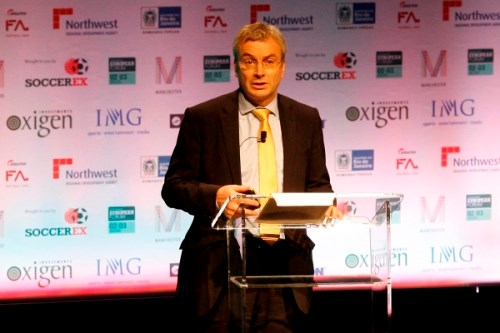Clubs get UEFA board spot

David Taylor, UEFA Events CEO, speaking at Soccerex 2010. Photo (c) Soccerex
03.03.2010
By Steve MenaryUEFA is set to give more ground to Europe’s leading clubs after disclosing that the board of a new company set up to optimise commercial revenue will be opened up to representatives of the continent’s clubs.
Speaking at the Soccerex conference in Manchester, David Taylor, chief executive officer of UEFA Events, said: “[UEFA] needs to improve its institutional relationship with clubs and the board membership will be extended to clubs. We need to improve our dialogue with the clubs.”
A handful of top clubs agitated for years over a potential breakaway European League until being persuaded to join a new European Clubs Association (ECA), which is chaired by ex-Germany captain, Karl Heinz Rummenigge.
UEFA Events has only just been set up and so far has just six board members: UEFA president Michel Platini and five other senior UEFA executives, including Taylor, who promised details on the inclusion of European clubs later this year.
The disclosure seemed to take ECA members at the conference by surprise but Jose Maria Cruz Andres, the vice president of Sevilla FC and member of an ECA committee looking into stability of European clubs, welcomed the news.
“Obviously something has changed at UEFA and that is good,” said Cruz Andres speaking a few hours after Taylor’s revelation.
However, Taylor appeared to rule out any wholesale offloading of TV rights for major international competitions or the Champions League and Europa League to subscription television channels that big clubs may seek to try and maximise revenue. Choosing his words carefully, Taylor told the conference: “We want to optimise revenue generation, not maximise it. In some instances, we could get more money if we sold everything to pay TV but we need to work within the parameters of the football organisational side [of UEFA].”
Taylor’s presentation gave the first glimpse into the financial position of UEFA events, which has taken control of commercial rights’ sales for the European body’s competition.
UEFA Events will have annual revenues of EUR 1.4 billion on a normal year but this is expected to rise to EUR 2.5 billion during a year that featured a European Championship, such as Euro 2012 in Poland and the Ukraine.
The European Championship, Champions League and Europa League are all profitable unlike UEFA‘s other two competitions, the UEFA Futsal Championship and the amateur UEFA Nations Cup.
Changing the UEFA Cup into the Europa League has produced “financial results double what we were seeing before,” added Taylor, who added: “In the next cycle, we don’t expect flat growth, we expect good growth in the figures we achieved in the last cycle.“ Revenue from the Champions League is expected to surge a third from EUR 820 million in 2006/09 to EUR 1,115 million in 2009/12. Taylor expects interest to continue to grow in Asia, where UEFA estimates that 387 million of the 1.25 billion worldwide viewing audience for the Champions League is derived.





